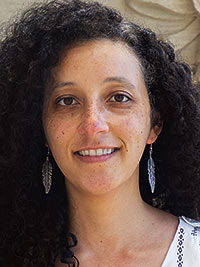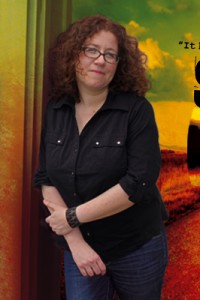Stina Leicht: Element of Magic
 Stina Leicht was born March 29, 1962 in St. Louis MO. She attended Sam Houston State University and the University of Houston, and returned to school to study 3D animation at Austin Community College in 2003, graduating in 2006. She has worked as a graphic designer, a bookseller, and in the gaming industry, and has been a full-time writer and freelancer since 2005.
Stina Leicht was born March 29, 1962 in St. Louis MO. She attended Sam Houston State University and the University of Houston, and returned to school to study 3D animation at Austin Community College in 2003, graduating in 2006. She has worked as a graphic designer, a bookseller, and in the gaming industry, and has been a full-time writer and freelancer since 2005.
Her debut novel Of Blood and Honey, a historical fantasy set during the Troubles in 1970s Northern Ireland, was published by Night Shade Books in 2011, and was a finalist for the Crawford Award for best first fantasy. It was followed by sequel And Blue Skies from Pain (2012). Leicht was a finalist for the Campbell Best New Writer award in 2012 and 2013. She lives in central Texas with her husband, Dane Caruthers.
Excerpts from the interview:
‘‘I started my first novel when I was in seventh grade. My father told me I couldn’t be a writer because he didn’t know any writers, so I stopped writing and didn’t come back to it until about the time I came down with cancer.
‘‘I got married in 2001, and had a high-paying job as a graphic designer, but I was laid off the day of my wedding. I came back from my honeymoon and didn’t find out I’d been laid off until I went to work and they said, ‘What are you doing here?’ I couldn’t find a job anywhere for a year. The schools were pumping out graphic designers left and right, and the economy was horrible so it was a complete disaster area.
‘‘I started writing again during that year of not having a job. I thought, ‘The whole point to doing what my parents told me was to be secure, and if I’m not going to be secure, I’m going to be a writer, damn it.’ Then I came down with cancer, and that was the real headbutt. I thought, ‘If I’m going to kack it, the one thing I’d regret not doing is writing, so I’m just going to write.’”
…
 ‘‘Of Blood and Honey is the third novel I wrote. Charles de Lint was very supportive of me, and I sent him an early draft version of it. It’s a short story, and he said, ‘Where’s the rest?’ So I thought about that. The first version of the book was set in modern-day Austin. The character who ultimately became Liam was fully aware of being a faerie. The Northern Irish stuff plot was his backstory. One day I went to this convention panel in Dallas and they were talking about cultural appropriation and fantasy. I was listening to these panelists going on who said, ‘Celtic mythology’s been mined to death. There’s nothing left there. Leave that all behind.’ I thought, ‘I’ve read Celtic mythology, and all of the things you claim are Irish – faeries and all that – bear no resemblance whatsoever to the actual mythology.’ American writers have pulled those figures from Ireland and transplanted them to over and over in the US. I thought, ‘But what if we stay in Ireland?’”
‘‘Of Blood and Honey is the third novel I wrote. Charles de Lint was very supportive of me, and I sent him an early draft version of it. It’s a short story, and he said, ‘Where’s the rest?’ So I thought about that. The first version of the book was set in modern-day Austin. The character who ultimately became Liam was fully aware of being a faerie. The Northern Irish stuff plot was his backstory. One day I went to this convention panel in Dallas and they were talking about cultural appropriation and fantasy. I was listening to these panelists going on who said, ‘Celtic mythology’s been mined to death. There’s nothing left there. Leave that all behind.’ I thought, ‘I’ve read Celtic mythology, and all of the things you claim are Irish – faeries and all that – bear no resemblance whatsoever to the actual mythology.’ American writers have pulled those figures from Ireland and transplanted them to over and over in the US. I thought, ‘But what if we stay in Ireland?’”
…
‘‘I think the second book, And Blue Skies from Pain, is happier. Liam actually starts to get his shit together in the second book. Everything terrible happens to him in the first book. In the second book he starts realizing that he has to face what happened to him and has to put his life together. By the end of the second book he starts that process. I’ve got an outline for a third volume, but my publisher fell apart.”
…
‘‘I love the religion and politics – it’s part of the worldbuilding, as far as I’m concerned. I’m fascinated. It’s part of the human condition. That’s one of the things that I think is missing in science fiction. The whole assumption that we’ve moved past religion, so it doesn’t exist in lots of SF. To me that’s shallow.
‘‘The struggle in Northern Ireland is not about religion, though. Religion is an easy handle, because it just so happens that the nationalists happen to be Catholic, and the Protestants happen to be the ones who want things to stay the way they are. They don’t consider themselves British, either. It’s really about class and power. It’s not really about religion, though spirituality is an important component of humanity. It’s not for everybody, mind you, but in general it’s a huge component of humanity. If you ignore it and pretend it’s not there, it seems unbalanced.
‘‘I’m not a Christian, and I don’t have an agenda when I’m writing. I think it’s wrong to run around and pound people in the face with that stuff. I personally believe that everyone should find whatever it is that makes them comfortable, and everyone should damn well be OK with that. Even in writing – some people want to teach, and some just want to entertain, and some want to do something literary, and there’s room for all of it. That’s the marvelous thing – that’s the way it should be. There should be room for all of it. When you start narrowing things down by saying, ‘It absolutely has to fit in this box,’ that’s when creativity has a hard time existing. Monoculture is bad for creativity.”
…
‘‘Now I’m working on something else. I’ve finished the first book, and I’m in the middle of the second book. It’s a secondary world fantasy, set in a world with late-1700s-era technology. There’s magical smallpox. It’s more American based. It’s YA, but I ride that line really fine. I tend to write the 17-, 18-, 19-, 20-year-olds, and I deal with it from a more adult perspective. I don’t know what they’re going to do with me, because I ride that line.’’




